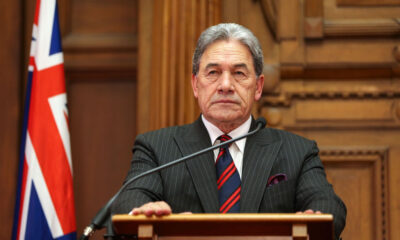World
Act MP Withdraws Bill to Criminalise Explicit Deepfake Images

Act Party Member of Parliament Laura McClure has withdrawn her proposed legislation aimed at criminalising sexually explicit “deepfake” images. The Deepfake Digital Harm and Exploitation Bill, designed to amend existing laws, sought to redefine and expand the definition of an “intimate visual recording” to include images or videos altered to depict a person’s likeness in intimate contexts without their consent.
McClure expressed her concern for the victims of deepfake abuse, stating, “Since I lodged my bill, I’ve heard from victims who’ve had their lives derailed by deepfake abuse.” This legislation aimed to protect individuals from the misuse of technology that can significantly harm reputations and personal lives.
Details of the Proposed Legislation
The bill intended to provide a legal framework for addressing the growing concerns surrounding deepfakes, particularly those that involve non-consensual intimate images. By broadening the definition of what constitutes a recording, the legislation aimed to fill gaps in current laws and offer greater protection for individuals.
McClure’s initiative came in response to increasing reports of deepfake abuse, where technology is used to create misleading representations of individuals without their knowledge or consent. These situations have resulted in severe emotional distress and reputational damage for many affected.
Despite the bill’s potential to address significant issues, McClure has opted to withdraw it from consideration at this time. The decision raises questions about the legislative process and the challenges of effectively regulating rapidly evolving technologies.
Implications for Future Legislation
The withdrawal of the Deepfake Digital Harm and Exploitation Bill highlights the complexities lawmakers face when attempting to legislate in the digital age. As technology continues to advance, the legal framework often struggles to keep pace, leaving individuals vulnerable to new forms of exploitation.
Moving forward, discussions surrounding the need for robust policies to combat deepfake technology are likely to continue. Advocates for victims of digital harm will be looking for renewed efforts to establish protections against this form of abuse. McClure’s experience underscores the importance of addressing the human impact of technology and the necessity for legislation that can adapt to emerging challenges.
The issue remains urgent, as deepfakes pose not only personal risks but also broader societal implications, including the potential for misinformation and erosion of trust in visual media.
As the conversation evolves, it will be crucial for legislators, technology experts, and advocacy groups to collaborate in developing effective strategies to combat the negative consequences of such technologies, ensuring that individuals are protected from harm in an increasingly digital world.
-

 World2 weeks ago
World2 weeks agoPrivate Funeral Held for Dean Field and His Three Children
-

 Top Stories3 weeks ago
Top Stories3 weeks agoFuneral Planned for Field Siblings After Tragic House Fire
-

 Sports3 months ago
Sports3 months agoNetball New Zealand Stands Down Dame Noeline Taurua for Series
-

 Entertainment3 months ago
Entertainment3 months agoTributes Pour In for Lachlan Rofe, Reality Star, Dead at 47
-

 Entertainment2 months ago
Entertainment2 months agoNew ‘Maverick’ Chaser Joins Beat the Chasers Season Finale
-

 Sports3 months ago
Sports3 months agoSilver Ferns Legend Laura Langman Criticizes Team’s Attitude
-

 Sports1 month ago
Sports1 month agoEli Katoa Rushed to Hospital After Sideline Incident During Match
-

 Politics2 months ago
Politics2 months agoNetball NZ Calls for Respect Amid Dame Taurua’s Standoff
-

 World3 weeks ago
World3 weeks agoInvestigation Underway in Tragic Sanson House Fire Involving Family
-

 Top Stories3 weeks ago
Top Stories3 weeks agoShock and Grief Follow Tragic Family Deaths in New Zealand
-

 Entertainment3 months ago
Entertainment3 months agoKhloe Kardashian Embraces Innovative Stem Cell Therapy in Mexico
-

 World4 months ago
World4 months agoPolice Arrest Multiple Individuals During Funeral for Zain Taikato-Fox





















